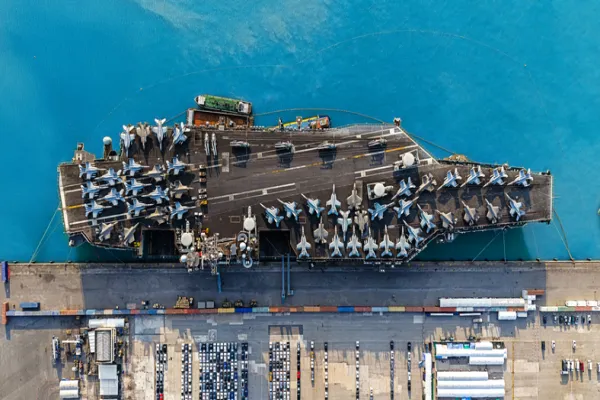Standard hotel room on a side street without a view of the Kremlin: E600. Room service sushi: 1,550 rubles. Moscow in December: Priceless?
This is the equation confronting increasing numbers of multinational business travelers as Russia enters its ninth straight year of ruddy economic growth and foreign direct investment on a per capita basis swells past that going into China. Between 2000 and 2005 the annual number of foreign visitors to Moscow more than doubled, to 3.5 million. In 2006 that figure was surpassed by October, according to government statistics. But to say that Moscow, and the rest of Russia, lacks enough world-class lodgings is a gross understatement. Bankers and executives traveling there on business must choose from a mere dozen or so four- or five-star hotels near the city's center. The result: room gridlock. "There are many weeks when our daily reports show 100 percent occupancy," reports Gerald Gaige, head of real estate consulting at Ernst & Young in Moscow. "I've never seen that before in my career."
Travelers are paying the price: The average fee for a double room hovers around $550 per night at midweek (not including an 18 percent tax), and the top hotels command even more. The Ararat Park Hyatt -- a 216-room hotel around the corner from the Bolshoi Theater and the go-to Moscow lodging for luminaries and political leaders -- charges $650 per night. The Ararat, which opened in 2002, rakes in the highest rates of any Hyatt property in the world, Srdjan Milekovic, the hotel's Serbian-born general manager, admits with discreet satisfaction.
Now new competition is rushing in to share the spoils. Developers, most of them Russians who are well connected within Moscow's building sector, are upgrading landmark Soviet hotels, scouring the city for scarce green-field sites and recruiting top multinational chains to manage hotel properties. All are jostling for positions within Moscow's Garden Ring, the second of the concentric circles that ripple out from the Kremlin, the center of power in the city.
A stiff challenge to the Ararat is due in June when the Ritz-Carlton is scheduled to open its new property, built on the site of the old Intourist hotel, 100 yards or so from the Kremlin walls. When it opened for business in 1970 at the foot of grand Tverskaya Street, the Intourist was a 25-story, 434-room glass testament to what the Brezhnev-era Soviet leadership considered modernity. In post-Soviet times it housed an incongruous mix of budget-minded European bus tourists and $50 prostitutes. Ritz-Carlton and Kazakhstan-based developer Capital Partners tore down the Intourist and built a new 11-story tower with 332 rooms and a façade to match that of the preRussian revolution National Hotel next door.
Two years ago the ultrafashionable Swissôtel Krasnye Holmy opened inside a sleek new office tower two miles downriver from the Kremlin. Occupying 13 of the building's 34 floors, the hotel's standard rooms, which offer sweeping views of the city, go for $500 a night. The rooftop bar offers 50 varieties of vodka at 450 rubles ($17) a shot. Also in 2005, Russia's Guta Group upgraded the 67-room, art deco Savoy, bringing the hotel back to its roots: Opened in 1913, the Savoy remained opulent through the 1920s -- modern dance pioneer Isadora Duncan stayed there while kindling her romance with Russian poet Sergei Yesenin -- but the hotel lost its panache in the late Soviet decades. From World War II until its rescue by the Guta Group, it also lost its name and was called the Berlin.
In the fall, Hilton will reopen the Leningradskaya, a renovated 275-room midprice hotel in one of Moscow's seven so-called Stalin towers. (The buildings earned the name in the 1950s when the dictator ordered the construction of the massive, identical structures, meant to show off the muscle of socialist engineering.) Another Stalin tower, housing the Hotel Ukraine, was sold in 2005 for $274 million to a relatively unknown Russian developer, Biskvit, and is also slated for an overhaul. In all, the total number of international-standard rooms in Moscow should jump by 25 percent during 2007, to about 5,000, according to Moscow-based Robert Stoddard, an American consultant with Hilton.
The Ararat Park Hyatt's Milekovic professes to be unfazed by his new rivals. "Moscow can be described in two words: supplier's market," he says. "I don't think the Ritz is opening here to bring prices down."
Industry observers agree, saying it will take a few more years for development to catch up with demand. Moscow's expected 5,000 rooms compare with more than 70,000 in New York, a similar-size city by population, if not economy. And the world's hoteliers face considerable obstacles to adding more properties.
Some issues are market-related. Russia's petroleum-fueled economic boom has bred shortages of real estate of all forms in the capital. Hotel operators also have to reckon with Russia's weakness as a tourist draw. Ingrained habits, starting with devilish visa procedures, keep away the upscale sightseers who might otherwise smooth out the ups and downs in business traffic.
Then there's the capriciousness of the Moscow municipal government under Yuri Luzhkov, the capital's mayor for the past 16 years. City Hall torments developers with a multitier approval process and requires ownership of up to 49 percent in the juiciest hotel schemes, leaving its private partners with all the costs. "The city is saying, 'You own 51 percent, but you have to take 100 percent of the risk of borrowing $500 million or $1 billion, then make a lease payment to us in the bargain,'" Hilton consultant Stoddard explains. "That's quite a burden for the developer."
Currently, one marquee hotel project is in limbo: the redevelopment of the site that was once home to the Rossiya hotel, a mid-1960s architectural abomination that had offered 2,722 rooms. The hotel's 2006 demolition left a yawning empty lot across Red Square from the Intourist. In 2004, after claiming its 49 percent of whatever would be built there, the city awarded a tender for the remaining stake to ST Development, a prolific Moscow builder headed by Shalva Chigirinsky, who once managed the city's stake in a regional oil refinery. Chigirinsky promised to invest $800 million in a new hotel and office complex. Another bidder, backed by Moscow bank Evrofinance Mosnarbank, offered $1.5 billion and lost. Last October the bank sued to overturn the decision and won a ruling in its favor from Russia's Supreme Arbitration Court. Moscow City Hall responded by saying that it had the right to award the project without a tender.
Across Red Square from the Rossiya, the rebuilding of the imposing Stalin-era Hotel Moskva appears to have been halted midconstruction. But according to Toronto-based Four Seasons, which has the rights to manage the property, the hotel is scheduled to reopen in late 2008 as a spanking-new 200-room, five-star accomodation. Ernst & Young's Gaige predicts that Moscow hotels have at least five more years to enjoy some of the highest prices on the planet. New supply will slowly come on stream as developers of office, retail and upscale residential space tack on hotels to diversify their sources of revenue, he adds. The Swissôtel is a pioneer of this trend. Others in the works include the next Hyatt, which is slated for a 2008 opening in Moscow City, a Canary Wharfstyle financial district under development near Moscow's western edge. The hotel will occupy the top 49 stories, floors 44 to 93, of what will be Europe's tallest building, the Federation Tower.
But Hilton's Stoddard predicts that the market will turn against hoteliers within two years. "If everything now planned comes on line, by 2009 supply should be greater than demand," he says.
As the vacant lots flanking Red Square testify, though, that is a big if.
At Moscow's peak: The Ararat
The bathwater still runs pistachio green on occasion, reminding guests of the old Soviet days. But the Ararat Park Hyatt in downtown Moscow hums with the sound of capitalism at work. At the breakfast buffet one recent morning, a senior executive from the southern U.S. quizzes a young Russian consultant on the intricacies of transporting cement. A table of international bankers talk retail sales trends and prices for farmland, switching among several languages. A lawyer from a Hollywood studio prepares to check up on new Russian contractors performing television postproduction.
Long gone are the once ubiquitous stewards of socialist tourism -- the sour-faced, ferocious matrons who guarded each landing, the bored young ladies who might have bothered to register guests if they had not been busy drying their nail polish. In their place Hyatt general manager Srdjan Milekovic oversees an army of gorgeous attendants who maintain perfect posture inside their suits and are ever ready to ask guests, "Is there anything else I can help you with right now?" in any of Europe's major languages.
Transplanting a world-class service culture onto Russian soil isn't easy, Milekovic notes. Hyatt uses low-cost local labor to bombard guests with help; 450 employees look after 216 rooms. Among the workers are five full-time staff trainers and an in-house hair-and-grooming adviser. "We instruct the staff in etiquette," explains the 40-year-old manager, who started his career with Hyatt in his native Belgrade. "We tell them what to do with their hands, how far to stand from people when they talk."
The Ararat is hardly extravagant by global standards. Its six stories are grouped around a standard-issue atrium featuring a glass elevator, and less-than-museum-quality abstract art adorns the hallways. "We were looking for a blend of the contemporary and timeless," Milekovic says. "Something that reflects modern Russia."
But the project was brilliant in its timing. The building's owner, whom Milekovic identifies only as an "Armenian family investor," started building the hotel just after Russia's 1998 financial crisis, on the site of a Stalin-era café gone to seed. Hyatt joined him in 2002 when the original manager, Hilton Hotels Corp., balked at extending credit to finish construction. The architects showed foresight in offering more stratospherically priced deluxe suites than any of the Moscow competition. These now lure high-rolling Russians as a weekend supplement to the international business travelers who make up 90 percent of the hotel's guests.
But green water, says Milekovic, should no longer color the Ararat experience. The hotel recently installed a filtration system to take the culprit, high iron content, out of the system. -- C.M.





